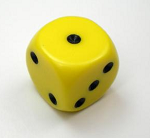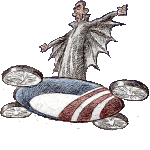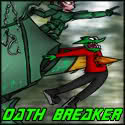|
Dr. Clockwork posted:A friend of mine had (to me) a pretty baffling take on PBTA in a thread on social media discussing the announcement of the Root RPG. I asked why PBTA is a "hard pass" for him. Reading Hamlet’s Hit Points really primed me for AW when I was MC for it a couple of years later. In it Laws maps out the beats of Hamlet, Casablanca and Dr No, and the first thing that is really glaringly obvious that in all three stories there are way more down beats and complications than upbeats and outright successes. Good stories rely on this for a sense of conflict, danger and the dramatic. Many RPGs and players suffer from the misconception that the only way to have fun is to press ahead and succeed while only losing renewable resources to do it. AW can be pretty mind opening that it’s actually more fun to face adversity and fail and be forced to change direction or compromise if players give it a chance. It makes the eventual victory all the more sweet. Like someone else pointed out, James Bond isn’t just him headshoting everyone until he wins. That would be boring to watch, but for a lot of people that kind of outcome is what they’ve come to enjoy in their RPGs. I hope you can get through to your friend and get him to give it a chance.
|
|
|
|

|
| # ? Apr 20, 2024 00:55 |
|
I feel like most time spent talking about PbTA is debunking the idea that every roll under 10 results in you getting your knees broken as the princess is decapitated.
|
|
|
|
CPA Hell posted:Reading Hamlet’s Hit Points really primed me for AW when I was MC for it a couple of years later. In it Laws maps out the beats of Hamlet, Casablanca and Dr No, and the first thing that is really glaringly obvious that in all three stories there are way more down beats and complications than upbeats and outright successes. Good stories rely on this for a sense of conflict, danger and the dramatic. Yeah, it's kinda important to understand that the complications are what creates plot. Otherwise you get this. https://www.youtube.com/watch?v=8FDrqrPGtvQ
|
|
|
|
Golden Bee posted:I feel like most time spent talking about PbTA is debunking the idea that every roll under 10 results in you getting your knees broken as the princess is decapitated.
|
|
|
|
Ash Rose posted:Playing a PbtA game and have been thinking about fights and how they are handled. The game we are playing right now mostly copied it's basic move list from DW and frustration with it got me thinking about alternatives to Hack and Slash and Volley. I peeked at AW and was kind of blown away by it's various bespoke types of fights it has it's own rules for, even if there are aspects of it I am less sure of. Another thing to keep in mind in pretty much any PbtA game is that the PCs adversaries need to actually do stuff that forces the PCs to react. It's well within your principles to say something like, "The massive Stone Troll swings his equally massive stone club in a whistling arc aimed straight for your head - what do you do?" (this is you making a move, you are announcing future badness by giving some indication of what might occur if the PC does nothing (you get brained)). And if the answer isn't, "Holy poo poo, I duck!" (which is almost certainly going to trigger act under fire) then it's cool to follow up your set-up move with inflict harm as established as a precondition to whatever they elect to do. Like, "Oh, you want to stand there and cast a spell? Awesome, but first take 4 harm and make the Harm move for me. You're miraculously still standing after getting clubbed like that? Righteous, what spell were you going to cast?" Don't let your foes stand around like dopes while the PCs hammer away at them. Have them do stuff that changes the fictional landscape or puts the characters (or the objective of the fight) in danger.
|
|
|
|
CPA Hell posted:Reading Hamlet’s Hit Points really primed me for AW when I was MC for it a couple of years later. In it Laws maps out the beats of Hamlet, Casablanca and Dr No, and the first thing that is really glaringly obvious that in all three stories there are way more down beats and complications than upbeats and outright successes. Good stories rely on this for a sense of conflict, danger and the dramatic. Part of the disconnection, I think, is that a lot of players secretly have 'fail conditions I am ok with' and 'fail conditions I do not want', and the games they play do not help them find out what those are and why they want or don't want them. For example, I would personally say Bond losing more than one fight a movie would make him look terribly incompetent (the one clean loss accounts for stuff like his early setback in Skyfall, for example), BUT him being a titanic fuckup as a person who alienates people all around him is something he needs to be an interesting character -- so if I was playing Raines Monk, the copyright-avoiding superagent, I wouldn't want to face too many complications at fighting but I'd want to have to face tons of hard decisions when I'm talking to my superiors, my girlfriend of the week, my old buddy in the Gadgeteering department...respecting this and not tripping the players' 'incompetence flags' is just as much a part of good GMing as anything else, I feel.
|
|
|
|
And I think that spins into the fact AW gives you freedom, as a GM, on how players fail which they're not used to from other RPGs. Most RPGs if you fail your fight check, you miss, or you take damage, or you lose the fight, or whatever. AW is very explicit that your moves don't have to be super basic - you can miss in your fight and have the result be that you stand victorious over a room full of crumpled bodies, and then turn around to see one bastard you didn't spot clambering out the window, the the secret weapon documents half-spilling out of his backpack. That's not a thing I think I see in most games, and it definitely takes the sting off characters who're meant to be unbeatable at X - like, sure, they are! They're not omniperceptive, though, as in this example, and this bad guy didn't make the losing choice of trying to make it a fight.
|
|
|
|
It’s also a way of approaching character stats that’s not very intuitive, especially if you’re used to other systems, where your stats are supposed to reflect competency. Here your stats are more like “what sorts of things do you want your character to face interesting consequences for trying.” Han Solo is a fast-talking maverick, so the reflex would be to give him good social stats, but it’s been noted many times that he never successfully talks his way out of anything; from a PbtA perspective, his “social stat” should be rock bottom. It doesn’t represent a lack of skill, but rather what his story beats tend to be. I should note that I don’t think AW, or indeed any PbtA game, does a good job of communicating this at all. e: This makes me think of a variant system where your stats/skills aren’t on a scale of good to bad, but instead classified as, like, “when using this skill, I usually just cleanly succeed in a non-flashy way” or “when using this skill, I usually get embroiled in a huge chaotic mess” or “when using this skill, I usually look great and maintain my composure, but can’t accomplish my goal and have to try a different approach.” megane fucked around with this message at 00:16 on Jan 23, 2022 |
|
|
|
It's a combination between the character's skill at the IC task overlapping with the player's skill at the OOC dice game. Normally they're in sync - the higher a bonus the character has, the easier the dice game is. The trick with PbtA is that the stakes are undefined. If you roll a failure to hit the other guy, you won't just miss, and you won't necessarily be sure what will happen. So if the bad guy does sneak out with the plans, the fact that "your character didn't fail to fight, they just failed to percieve" doesn't necessarily help, because the player still knows that it was their dice roll that triggered the situation.
|
|
|
|
Atomic Robo does a great job of your character having skills that they just succeed at. I think you get an ultimate skill that you don’t have to roll, I forget if you have to use a fate point tho.
|
|
|
|
hyphz posted:It's a combination between the character's skill at the IC task overlapping with the player's skill at the OOC dice game. Normally they're in sync - the higher a bonus the character has, the easier the dice game is. Stakes are usually defined, though, just like in most games. What probably happened before this is that the goons showed up and demanded the plans or they'd shoot the place up. The difference is that instead of having a bunch of rolls in a slugfest to determine if they get it like you would have in D&D, there's usually one or two rolls to determine how the fight shook out.
|
|
|
|
I'd say the stakes are better defined in AW than in most game systems. WOD in particular stands out to me as a system where the stakes look like they're well defined, because there's a lot of words, but in practical, at the table terms, player and GM are both often struggling to justify actual applications. It's particularly acute since often the consequences of one of success or failure pertain to the fiction, but the other does not, so it's the right "move" to use for that situation but it also doesn't make any goddamn sense. BITD is somewhat more systematic than AW but it's really just kind of a little more forewarning and it's basically PBTA anyway.
|
|
|
|
Yeah, the fact fights have to be about something in PBTA is another scope change. It's genuinely kind of hard to have a fight where you just run into three orcs and you fight in a PBTA game - moves usually won't make much sense. But you're trying to grab some plans out of a supervillain's office, and you miss? Then it makes sense. And if you'd hit you could have taken hold of the plans or whatever the equivalent is in your system.
|
|
|
|
That's at a scene level, though. At a roll level in a standard game, the stakes are - if you roll well you hit and if you don't you don't hit and then maybe you're in a worse position by being next to an ininjured enemy. What you're trying to achieve by fighting doesn't necessarily matter, the only thing you can cause to happen by rolling is that damage.
|
|
|
|
hyphz posted:That's at a scene level, though. At a roll level in a standard game, the stakes are - if you roll well you hit and if you don't you don't hit and then maybe you're in a worse position by being next to an ininjured enemy. What you're trying to achieve by fighting doesn't necessarily matter, the only thing you can cause to happen by rolling is that damage. I'm not sure what a "standard game" is, but the stakes in Apocalypse World are very specifically not that, and that's what everyone else is talking about. The Seize By Force move requires that you set stakes outside of just inflicting harm, so in this hypothetical situation the stakes would be "recover the plans" and the method of doing so is violence. Violence happens regardless of whether you succeed or fail, but if you fail you're going to lose the plans. That's why people are further contrasting it against DW, a game in which the stakes for attacking are in fact just "do damage", but the fail states can end up being weird narrative poo poo.
|
|
|
|
admanb posted:That's why people are further contrasting it against DW, a game in which the stakes for attacking are in fact just "do damage", but the fail states can end up being weird narrative poo poo. The "stakes" go in both directions. They are what you lose if you fail, and what you get if you win. If the fail state is "weird narrative poo poo", then whatever that weird narrative poo poo consists of is included in the stakes. If you don't know in advance what the weird narrative poo poo is going to be, then you can't set the stakes, and that's upsetting for players who want to play the system like a casino dice game. If you do some damage to the guy if you win, but lose access to the plans you were after entirely if you lose, the odds had better be way in your favour for you to even make that roll.
|
|
|
|
hyphz posted:The "stakes" go in both directions. They are what you lose if you fail, and what you get if you win. If the fail state is "weird narrative poo poo", then whatever that weird narrative poo poo consists of is included in the stakes. Why did you only read half of my post. In Apocalypse World you set the stakes for Seize By Force (the standard "combat" roll): if you succeed, you get the plans. If you fail, you don't get the plans. No matter what, harm is exchanged. That is exactly the opposite of your claim that PbtA "doesn't set clear stakes."
|
|
|
|
Hyphz, you played in an AW game. I know because I was there. Did you get the impression that the "stakes" weren't clearly set during that game? This feels like a problem that exists only in your head, I'm sorry to say, and that you should have realised is entirely false by now.
|
|
|
|
Tulip posted:BITD is somewhat more systematic than AW but it's really just kind of a little more forewarning and it's basically PBTA anyway. but the downside seems to be that you have to have that discussion every time they roll for a move. I'm not very good at adjudicating that so I'd rather have AW's premade moves instead.
|
|
|
|
admanb posted:In Apocalypse World you set the stakes for Seize By Force (the standard "combat" roll): if you succeed, you get the plans. If you fail, you don't get the plans. No matter what, harm is exchanged. That is exactly the opposite of your claim that PbtA "doesn't set clear stakes." Seize by Force does give the player a bit more control than many examples. But your example isn't quite right: on a sieze by force miss you get to pick one of the options for "seize by force" is, "you take definite and undeniable control of it". So actually, it's possible that if you fail the roll, you do get the plans, but suffer more harm and do not "impress, dismay or frighten the enemy". But.. how is that worse than if you'd picked those 2? Or if you fail the roll and you don't choose that option, that means you dont' "take definite and undeniable control of it" but do you take some control of it? Does not taking definite and undeniable control mean that they can snatch the plans straight back again or that they're at greater risk of being stolen in the future? And Seize by Force is one of the clearer moves. How about these: Apocalypse World posted:Go Aggro: On a miss, be prepared for the worst. We can argue about what that means in game terms, but in conversational terms, "be prepared for the worst" is not what you say to someone who is taking a controlled risk. Now, this can all come out in the conversation of course, it's not something that makes the game impossible to play, if players are up for playing risky and fast-paced (which is how I played the AW game I was in). But if you've got a player who wants to play the dice odds like a casino, who'll say "well he hits me x% of the time and I hit him y% of the time and my HP are z% greater than his" and so on then they might want to talk this whole thing out before they roll any dice, and then they have to ask about all the other moves, and before you know it it's become exhausting and opaque. It's not better or worse than the other style of play, but I can see why people who prefer it might not engage well with AW.
|
|
|
|
The trick to those is the second half of the rule is in the GM's side of the book. On a miss, the GM makes a move, and that's kind of an art the book tries to explain.
|
|
|
|
Siivola posted:I found BitD more systematic in the sense that you have the discussion about stakes and expectations when the players roll for a move Amusingly for my group we found the BITD style so intuitive that it's bled backwards into AW. Now we tend to go "OK so I'm rolling Under Fire, if I succeed x happens and if I fail y happens, right?" hyphz posted:Now, this can all come out in the conversation of course, it's not something that makes the game impossible to play, if players are up for playing risky and fast-paced (which is how I played the AW game I was in). But if you've got a player who wants to play the dice odds like a casino, who'll say "well he hits me x% of the time and I hit him y% of the time and my HP are z% greater than his" and so on then they might want to talk this whole thing out before they roll any dice, and then they have to ask about all the other moves, and before you know it it's become exhausting and opaque. It's not better or worse than the other style of play, but I can see why people who prefer it might not engage well with AW. I can't imagine that sort of player playing well or having fun in any RPG system. Maybe in All Of Their Strengths or Wanderhome or something else where there's no randomness that players engage with directly, but virtually every other RPG I can name is built around having moments where the PCs can suffer sudden random reversals, positive or negative, and a player who loses their poo poo whenever confronted with the core of the game seems like a miserable tablemate.
|
|
|
|
hyphz posted:We can argue about what that means in game terms, but in conversational terms, "be prepared for the worst" is not what you say to someone who is taking a controlled risk. "Be prepared for the worst" means "the MC can make as hard and direct a move as they want," which is explicitly spelled out in the book. And before you say "but that means it's impossible to predict the stakes," no, it doesn't, because the MC is constrained by the rules to make a move that follows (I.e. the move has to follow logically from the fiction), always say what honesty demands (I.e. if the player asks "what is the likely outcome if i try this and fail?" the MC must answer honestly), and is encouraged by their moves to tell them the consequences, then ask (I.e. the MC themselves should often be saying "so, you know if you beef this Roarke's guys are gonna stomp the poo poo out of you. You sure you wanna go for it?"
|
|
|
|
Tulip posted:I can't imagine that sort of player playing well or having fun in any RPG system. Maybe in All Of Their Strengths or Wanderhome or something else where there's no randomness that players engage with directly, but virtually every other RPG I can name is built around having moments where the PCs can suffer sudden random reversals, positive or negative, and a player who loses their poo poo whenever confronted with the core of the game seems like a miserable tablemate. I don't know. If you think of a typical D&D adventure, if you're going to go get the plans from the bad guys, then you break in and face a mapped and scripted combat encounter which ends with you either getting the plans, or all the PCs dying and the campaign ending because players are notorious for not retreating. There's no real risk of the encounter ending with it decided that you don't get the plans - even if one of the bad guys could technically grab the plans and run out of the encounter area, they probably won't because the system is so terrible at modelling a chase through the city. Even if a player rolls a critical failure on an attack, that's just some HP off them, not a failure of the entire encounter. If the fight generally goes badly then it maybe causes attrition to the PCs and affects how soon they need to rest, but they will get to rest without much changing. And the interesting thing is, that actually seems to be enough. Looking at it from the outside it seems insignificant but to a tactical player, simply having the experience of their tactics failing is enough of a negative consequence because the player feels it as a failure of their play and/or character optimisation. The fact that the adventurers had to go for an 8 hour kip after being beaten on by a bunch of punks itself is a penalty in the story even if they don't lose anything as a result of resting, because they aren't readers, they are those adventurers, and that's not what heroes ought to do. I don't necessarily agree with this viewpoint but I've started to understand it more and it makes at least a bit of sense. Most of these players will resist hammer-and-tongs any of the "campaign loss" type ideas, because they've already felt the pain, and having a period of future play defined not by progress towards their goals but by a sidetrack involving recovering from a mistake is too much of it. So yea, having the stakes involve not getting the plans and then having to work out how to carry on without them is a hell of a bet for that type of player, and they might not want to take it or might want to hedge it as much as possible. That's not to say that it's not fun to play other ways, in fact when I tried it I found that it was, but it wasn't the same, and people might want the same.
|
|
|
|
What you're really getting at is the type of player who hates to lose in any facet of the game. I posit that if you hate to lose, you should not be playing games in which random chance is a factor, because no matter how much you stack the odds in your favor there is always X% of the time you will fail, and when/where/how that happens is by definition unpredictable. Also, the gameplay experience where success or failure essentially comes down to how many renewable resources are expended to gain the victory are mind-numbingly boring to actually play. Added to which, "resting for 8 hours while still in the dungeon" to recover those resources is the most asinine thing I can think of, and also utterly wrecks my suspension-of-disbelief.
|
|
|
|
It would be funny if player characters discovered a dungeon because they found five people camping outside.
|
|
|
|
I need recommendations for PBTA games that, in addition to having cleanly laid out play references (moves sheets, playbooks, GM prep sheets, etc.), have little to no content that's either excluded from the play sheets (such as rules buried in the core book, like Fellowship's changing main playbooks available to anyone at level 5, Fellowship moves, and the stock list of threats) or else a pain in the rear end to get printed and assembled (such as Ironsworn's library of asset cards, which an entire table is supposed to pull from with no duplicates; printing individual replacements is a non-starter and printing and cutting entire sheets of assets for each game is wasteful and frustrating). I like these games but they're not set up to have handy to play on a whim with people who don't already know how to play.
|
|
|
|
Ilor posted:What you're really getting at is the type of player who hates to lose in any facet of the game. Well, they should hate to lose, shouldn't they? I mean, not in a negative sense where they start flipping the table and walking out in a huff if things go badly, but losing shouldn't feel the same as winning, even if there is a narrative necessity. If I'm a Spider-Man fan and he's in a fight with the master villain in episode 1, I'm pretty sure he's going to lose, because if he won there wouldn't be an episode 2. At the same time, I shouldn't feel totally neutral about it; because if I do, then I also won't get to feel elated when he does win in episode 10. The trick of suspending and unsuspending disbelief necessary to see both at the same time is quite unusual and I don't think it's really bad to say that some people just do not want to do it. quote:Also, the gameplay experience where success or failure essentially comes down to how many renewable resources are expended to gain the victory are mind-numbingly boring to actually play. Thought experiment: suppose we take any game or sport you like, and run a tournament where everyone plays a series of matches against house teams. You start with 1000 points, and after each match you lose points points based on how well or badly you did. However, even if you lose the game you still carry on (you just lose a larger number of points) and 1000 points is too many for you to lose them all by the end. So you will play through the entire tournament no matter what, and you will reach the end and at the end you will have a score you can compare to others. Note that we did not put any limits on what game was being played. So is it true that no matter what game it is, even if it's a masterpiece game that you love, it will become "mind-numbingly boring" because it is now fitted into a structure where you always "win" but just expend more points doing so? Well, no, of course not. I mean, it can't be less enjoyable than just meeting up and playing the game a few times without keeping a running score just because they enjoy it, and people do that all the time. Now sure, people who want to play the wargame/combat component of an RPG for the joy of it are not the type of player that PbtA supports, but they are not "worse" than that type of player.
|
|
|
|
Iron Heart posted:I need recommendations for PBTA games that, in addition to having cleanly laid out play references (moves sheets, playbooks, GM prep sheets, etc.), have little to no content that's either excluded from the play sheets Masks, spirit of 77, Bedlam Hall, cartel*, The sword the crown and the unspeakable power, Monster of the week, WWWRPG*, apocalypse world, & All things under Heaven, should be good with minimal print outs. The ones with asterisks have additional player aids that aren’t required. You could also run comrades, legacy: life among the ruins and the sprawl with minimum book looking.
|
|
|
|
hyphz posted:Well, they should hate to lose, shouldn't they? I mean, not in a negative sense where they start flipping the table and walking out in a huff if things go badly, but losing shouldn't feel the same as winning, even if there is a narrative necessity. If I'm a Spider-Man fan and he's in a fight with the master villain in episode 1, I'm pretty sure he's going to lose, because if he won there wouldn't be an episode 2. At the same time, I shouldn't feel totally neutral about it; because if I do, then I also won't get to feel elated when he does win in episode 10. The trick of suspending and unsuspending disbelief necessary to see both at the same time is quite unusual and I don't think it's really bad to say that some people just do not want to do it. I think it depends on what "losing" means. The chat thread has been talking about death in games and yeah, if "losing" in a game is complete party wipe the game is now over, then that sucks. If losing is the character you've been playing for a year is dead now, again, that sucks and there aren't many people that aren't going to feel a little bit bad about it. A less extreme example: my group stopped playing a game recently because the cost of failure was so high it would always wreck what we were doing, so we moved to a system where you don't just die or have all your arms and legs fall off if you lose a single coin-flip and hey, it turns out that even when you have a session where you fail literally every roll and you fall unconscious for 20 hours and get captured by local law enforcement its still fine and you don't get the "I don't want to play this anymore" response. A friend described it as "when losing breaks the cohesion of the narrative (if there is one)" is when you hate to lose and get the feelbad stuff. Otherwise, while losing won't feel as good as winning, it doesn't have to feel bad.
|
|
|
|
Good PBTA design can result in losing feeling better than winning.
|
|
|
|
hyphz posted:Well, they should hate to lose, shouldn't they? I mean, not in a negative sense where they start flipping the table and walking out in a huff if things go badly, but losing shouldn't feel the same as winning, even if there is a narrative necessity. Some people are just unable to accept that failing forward is a legitimate step in RPGing. Fortunately, those folks usually get filtered out of decent groups by age or inclination of the other members.
|
|
|
|
I mean tbf, it's still bad to lose and feels like poo poo most of the time. Like, I get why people fail in stories and so on, but it's a hard thing to have to keep working through.
|
|
|
|
A lot of it is tone. It’s much less painful to fail in a comedy game than if you’re playing night witches.
|
|
|
|
Admiralty Flag posted:If you've never been at a table with a power fantasy player who believes that any failure of their character, no matter how dramatically logical or compelling -- even if it's failing forward -- you are a lucky person indeed. One major point here is that D&D has no inbuilt interesting consequences for failure provided by the mechanics. It's basically death, equipment loss or "can't open door"/"doesn't find secret" with a side order of "roll to continue the plot" which is the least interesting consequence of all. And even character growth in D&D is strictly linear. So D&D effectively teaches people this bad meme unless a good DM overrides it.
|
|
|
|
Golden Bee posted:Bedlam Hall I had somehow never heard of this one, and on looking it up, I'm torn between a desire to run it and a fear that my players would hate each other and me by the end of the first session.
|
|
|
|
The best description I ever heard was “it’s upstairs/downstairs but you work for the Addams family“. I’ve never run it in campaign so the secret system is kind of perfunctory.
|
|
|
Tulip posted:Good PBTA design can result in losing feeling better than winning. 1000% this. A result of 6 or less is where all the fun lives in good PBTA games. That said, one of my peeves with failure results comes from games that feature debt mechanics like Impulse Drive. The party does a mission/score/etc only to find out that, whoops, they didn't make any cash and they're now even further behind the eight ball than before. It makes narrative sense but what a kick in the balls. Better do something about that debt before any of the cool poo poo you wanted to do instead!
|
|
|
|
|
This is why I think Blades doing the "don't screw people out of their payday" thing is good.
|
|
|
|

|
| # ? Apr 20, 2024 00:55 |
|
hyphz posted:Well, they should hate to lose, shouldn't they? hyphz posted:Thought experiment: [SNIP] Contrast this with AW, which directly counsels that the best hard moves aren't those which are mean (severe), but rather those which are irrevocable.
|
|
|






























